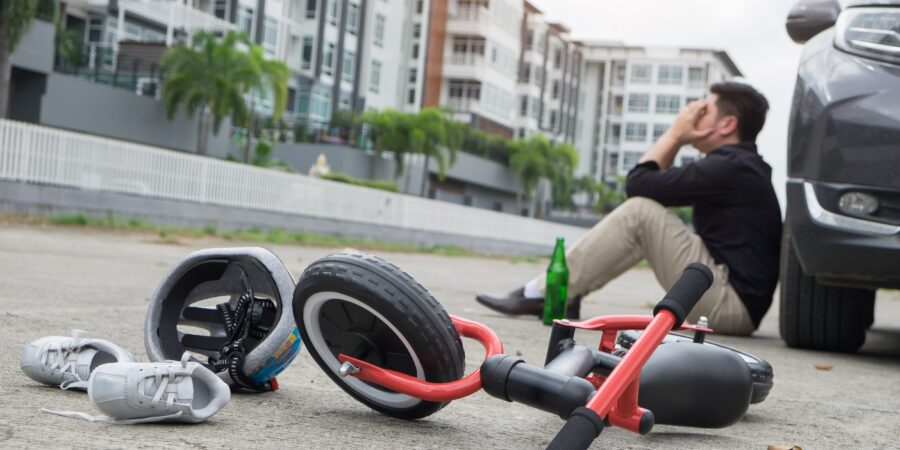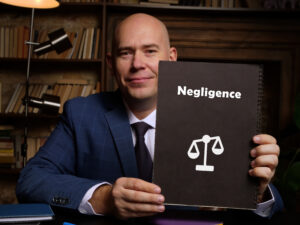What Makes a Fatal Accident a Wrongful Death?
Wrongful death occurs if someone with a personal injury claim dies as a result of that injury.
These claims are heard in civil court and brought by the survivors of the deceased. The at fault party might also face criminal charges brought by the state. Work injuries resulting in death are generally handled by workers’ compensation programs.
You may file a civil lawsuit for the wrongful death of a family member while the defendant is facing criminal charges for the same injury. You do not have to wait until a decision is reached in the criminal proceeding.
When Is the At Fault Party in a Fatal Accident Considered Negligent?
A wrongful death is a fatal accident, but not all fatal accidents constitute wrongful death. Wrongful death occurs only when the at fault party is negligent:
- Gross negligence: This term most often applies to serious medical malpractice cases involving reckless and irresponsible conduct. An example might be a medication error leading to sudden death.
- Contributory negligence: With this type of negligent behavior, a single person is responsible for only a portion of the fault. The rest of the fault lies with other negligent parties.Let’s say that a motorist is struck and killed by a fast-moving bus after the bus blows a defective tire. In that case, the bus company, the bus driver and the tire manufacturer may all be partially responsible for the car accident.
- Comparative negligence: This kind of negligent activity occurs when the deceased contributes to their own demise. If you are visiting a store where a visible wet floor sign is displayed and you die from a fatal slip and fall, you may be found responsible because you were clearly warned about a hazardous condition, but you walked on the wet floor anyway.
- Vicarious negligence: In this scenario, someone is indirectly responsible for the death of another. If your dog bites someone who then dies of rabies, you are responsible for the damages inflicted by your dog even though you did not harm anyone yourself.
How Is Negligent Action Established?
To establish that a party was negligent and prevail in a wrongful death action, the survivors of the deceased must clearly show these five things:
- An accident occurred
- The deceased was owed a duty of care
- The defendant violated that duty of care
- A fatal accident resulted from the breach of duty to care
- The survivors bringing the suit have suffered mental, emotional, physical or financial distress because of the death
When the duty of care to another is violated, it provides the grounds for a wrongful death claim. If you have lost a loved one because of negligent actions taken by someone else, a consultation with a personal injury attorney can help you understand your rights under the law.
What Are Some Examples of Wrongful Death?
- A person is intentionally killed.
- Someone dies due to medical malpractice.
- A fatal car accident is caused by a driver who is drunk at the wheel.
- A motorcycle rider suffers a fatal accident after being hit by a texting driver.
- A workplace injury or illness culminates in death.
- A guest slips, falls and dies due to dangerous conditions on your property.
- Someone dies after being injured by a defective product.
Fatal Accidents in the Workplace
Employers are responsible for ensuring worker safety under OSHA. Nevertheless, workplace injuries are common, especially in industrial settings. In fact, the workplace is the second most likely place for a wrongful death to occur.
The family of the deceased is typically compensated through the workers’ compensation system. Nevertheless, you might have to file a wrongful death claim against your loved one’s former employer.
Fatal workplace accidents are most common on construction sites, in chemical plants and anywhere else where high-risk activities are routinely carried out in high-risk environments. Four types of workplace accidents, otherwise known as the “fatal four,” are most likely to cause injuries that result in death:
- Electrocution
- Getting trapped between machines, tools or devices
- Getting struck by moving vehicles or moving objects
- Slips and trips
- Falls from high places
How Are Survivors Compensated in Cases of Wrongful Death?
It’s difficult enough to lose a loved one when they die of natural causes. It can be devastating when your loved one dies in a fatal car accident that could have been prevented if someone else had not been negligent.
Family members typically use their compensation packages to cover funeral and burial costs, legal fees, lost income and final medical expenses. Wrongful death claims that compensate survivors ensure that employers, companies and individuals are held accountable for negligent actions.
Unfortunately, even substantial financial compensation cannot replace a lost loved one. A personal injury attorney can represent you in court and demand that you receive maximum compensation for your losses.
What Are Punitive Damages?
If a defendant has been exceptionally reckless on top of being negligent, punitive or exemplary damages may be awarded to punish the defendant and set an example for others engaging in similar misconduct.
For example, a drunk driver who causes a car accident that results in a wrongful death may be ordered to pay punitive damages to the survivors. Punitive damages may be awarded when a drunk driver consciously and intentionally drives while drunk, even with full knowledge that alcohol can make them a danger to others.
Punitive damages are meant to punish the defendant for blatant disregard of the safety of others. They were not designed to compensate survivors for their losses.
Nevertheless, the plaintiff receives most if not all of the punitive damages compensation amount. These damages may also be awarded when compensatory damages are simply not enough to offset catastrophic losses.
What Kinds of Compensation do Families of the Deceased Receive?
Wrongful death survivors receive both economic compensation and noneconomic compensation. Economic compensation covers the financial costs of the wrongful death:
- Medical expenses for the care of the deceased just prior to death
- Funeral, cremation or burial costs
- Loss of household services and child care previously provided by a deceased partner
- Future financial support equal to what the deceased would have earned
- Compensation for benefits and gifts that you received as a partner of the deceased
The amount of future financial support you receive will depend on the age of your loved one and their employment history. It will also reflect that person’s education, career goals and projected income.
The estate of the deceased can also file a survival action and receive compensation for pain and suffering endured during a loved one’s final days. A personal injury lawyer can advise you about whether a survival action would benefit your case.
California wrongful death law provides for noneconomic compensation for mental and emotional pain and suffering caused by the sudden and unexpected loss of a loved one:
- Loss of moral support
- Loss of attention
- Loss of guidance
- Loss of companionship
- Loss of a sexual relationship
- Loss of affection
Although real, these intangible losses are difficult to calculate and challenging to prove. A personal injury lawyer can help you to gather and show evidence of noneconomic losses.
Depending on your circumstances and the expertise of your personal injury attorney, you might receive as much or more compensation for noneconomic losses than you would for lost services and future income.
Who Can File a Wrongful Death Lawsuit?
As the representative of a deceased person, you can file a wrongful death claim if you suffered or were harmed because of your loved one’s death. Wrongful death laws allow survivors to seek fair compensation for their losses.
It doesn’t matter whether the actions that caused death were negligent or malicious. Defendants may be acquitted of murder or manslaughter and still be convicted of the wrongful death of another.
Can I Sue for Wrongful Death in Nevada If I Live in California?
You can file a civil lawsuit for the wrongful death of a family member that occurs in Nevada even if you live in California. Moreover, you can file suit while the defendant is still facing criminal charges for malicious and negligent activities.
At JT Legal Group, we are licensed to practice law in both Nevada and California, and we handle wrongful death cases for clients living in both states.
We will defend your right to a fair settlement in any accident that was caused by the negligent actions of others and terminated in a wrongful death.
If you have lost a loved one due to a wrongful death, contact JT Legal Group now for a no-cost case evaluation. You owe us nothing unless we win your case, so you really have nothing to lose.



